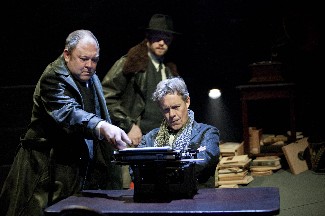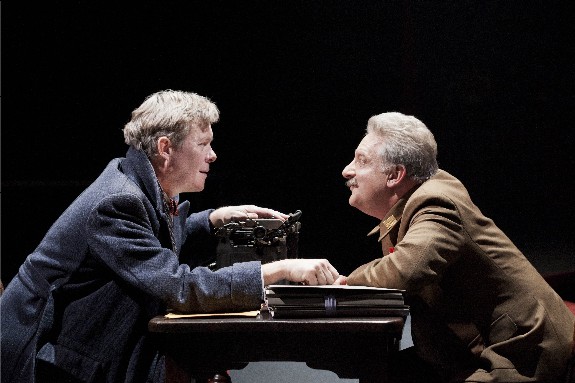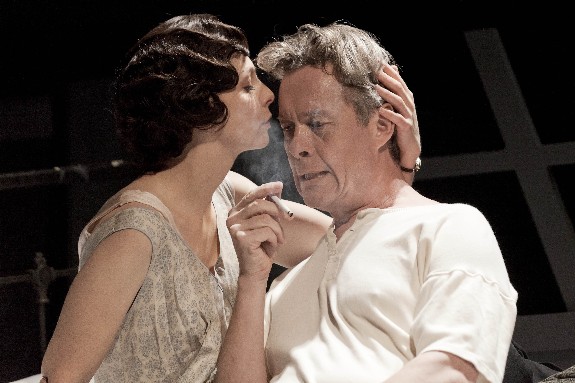Fuse Theater Review/Commentary: NT Live Presents a Cynical “Collaborators”
Playwright John Hodge chooses to ignore the complexity of the dissident writer’s experience — expedience for the sake of protecting something of value from destruction, an author fighting his inner demons to live long enough to finish what he believes to be a work of art that is also an act of political defiance.
Collaborators by John Hodge. Directed by Nicholas Hytner. Set designed by Bob Crowley. Presented by The National Theatre in HD. Check on the NTLive site to check for remaining screenings in New England. Screening at the Coolidge Corner Theatre, Brookline, MA on December 15.
In the broad field of Russian letters in the USSR I was the one and only literary wolf. I was advised to dye my fur. Absurd advice. You can dye a wolf, clip a wolf—he still doesn’t look like a poodle. — Mikhail Bulgakov, Letter to Joseph Stalin, May 30, 1931

Mark Addy (Vladimir), Marcus Cunningham (Stepan), and Alex Jennings (Mikhail Bulgakov) work out creative issues in COLLABORATORS. Photo: Johan Persson
By Bill Marx
Collaborators, the latest presentation of NT Live, has the dubious dramatic distinction of making one of the leading Soviet dissidents of the 1930s, novelist and playwright Mikhail Bulgakov (1891–1940), look like a poodle, one of Stalin’s duped lapdogs. That it does so by jamming the writer into a Faustian bargain scenario, turning the price for success into a barbaric deal with the devil, says more about the drab cynicism of our times than it does Bulgakov’s real life stand for art and conscience against an authoritarian regime. If artists today kneel guiltily before the compromises demanded by commerce, it must be comforting to imagine that heroes of the past had clay feet—it makes us feel so much better about selling out.
It is easy to see the deconstructive game screenwriter-turned-playwright John Hodge (Trainspotting, Shallow Grave) sets up in Collaborators. His use of history is selective: yes, physically and mentally ill, poverty-stricken, near the end of his life, the author of nervy satires of Soviet life (Heart of a Dog, The Fatal Eggs) wrote a play (Batum) about the life of young Stalin. It was never produced. Out of that curious factoid Hodge whips up a mechanical, tragic fantasia in which Bulgakov is offered an opportunity to have his play Moliere returned to the Moscow Art Theater stage (it was yanked off by the censors when after it premiered in 1936) if he collaborates with Stalin on a theatrical hagiography.
In no time, the jolly dictator offers a diabolical swap—he will pen the propagandist drivel if Bulgakov will make some inevitably homicidal governing decisions. That Bulgakov accepts this power without making any demands—such as changing the agenda he is handed—shows the fix is in. What starts out in the first half as a sour farce turns into a predictable, murderous nightmare, with the viewer having to believe that a man who spent decades maneuvering for his life through Soviet hell, including fielding a phone call from Stalin himself, would not have the slightest idea about what he had gotten himself into. Apparently, the need to see his work produced on stage (not even selling his soul outright) is enough to blind him to his rationalizations. Eventually, the play’s Stalin announces the theme of the evening for him and those who hadn’t gotten it: “Monsters always win.”

Alex Jennings (Mikhail Bulgakov) and Simon Russell Beale (Joseph Stalin) square off in COLLABORATORS. Photo: Johan Persson
But they don’t, or at least the situation is much more ambiguous in Bulgakov’s case. What Collaborators doesn’t tell us is that when he was paying his dues to young Stalin Bulgakov was also continuing to write, revise, and hide The Master and the Margarita, one of the greatest Russian novels of the 20th century. He had burned the first draft in the early ‘30s out of fear, but then painstakingly wrote the book again—it was not published in the Soviet Union until the late ’60s. Here is the complex drama of cat-and-mouse that Hodge chooses to ignore — expedience for the sake of protecting something of value from destruction, an author fighting his inner demons to live long enough to finish what he believes to be a work of art that is also an act of political defiance. Bulgakov’s novel is an indispensable means to imagine the kind of monster Stalin was — underneath the poodle the wolf remained.
But Collaborators is not interested in complicating its caricature of writerly integrity taken down by a moment of exhaustion/weakness. As I said earlier, the game Hodge plays in the script isn’t hard to see: at times Stalin sounds a lot like the money men and producers of Hollywood, demanding creative short cuts, hammering away at artistic independence. But these (parodic?) intimations of cinematic compromise explain why the play is so far off the mark: unlike dissident writing, movie-making is a collaborative creative act. Bulgakov’s life-and-death duel with the insane powers-that-be makes for an ill-fitting stand-in for the Tinsel Town perfidy that Hodge may have somewhere in the back of his mind.
The truth is, for dissidents the most valuable collaborators are those who help them continue their subversive activity, lend friendship and support despite the risks to themselves—tellingly, those kind of collaborators are few and thinly drawn figures here, from the stereotypes in the cramped apartment house (former landowner, history teacher, and uncompromising idealistic author) to Bulgakov’s loyal wife, Yelena, who is treated as nothing but a damsel-in-distress. Hodge doesn’t dare have his protagonist share reflections about his ordeal with Yelena or others, aside from your standard humorously threatening secret police types, because that would highlight Bulgakov’s superficiality and ethical corner-cutting.
And this brings up another issue. If the writer had no strong principles in the first place, why should we care if he cuts a deal with a demon? Is this the Bulgakov of history? Or a faux-factual puppet cut down to size? Collaborators doesn’t come up with a strong answer, and there is a suspicious confusion about the issue — in the filmed prologue before the play director Nicholas Hytner says that the play isn’t to be taken as history, But then why use Bulgakov at all unless Hodge and company want to dramatically piggy-back on the reputations of the past? Why are some crucial and inconvenient facts in this fantasia left out?

Jacqueline Defferary (Yelena) and Alex Jennings (Mikhail Bulgakov) commiserate in COLLABORATORS. Photo: Johan Persson
The National Theatre production, presented from the small Cottesloe Theatre, moves with a sleek, movie-lite dexterity, making use of the widest variety of camera angles in any of the NT Live productions that I have seen. The lighting is dankish and dark, perhaps to make sure spectators don’t see the audience members sitting at the edges of the theater-in-the-round space or to create a film noirish effect. The performances are sure-footed, though they never take off into a compelling idiosyncrasy — Alex Jennings makes for a convincingly harried but generally cartoonish Bulgakov, with Simon Russell Beale contributing a jolly and cajoling Stalin, a satiric portrait of a tyrant posing as a good buddy, but the performer, for all of his great skill, never suggests the heart of evil.
Finally, Collaborators suggests some interesting notions about NT Live and its impact on theater. With its short scenes, visual segues, and clipped dialogue, John Hodge’s first play comes off as more of a screenplay than a theatrical script. As ‘live’ screenings of dramatic productions become increasingly successful economically, how might this approach shape the production of plays? Might it change our expectations of the theatrical experience? Will the lure of technology and big screens (which will spread to other stage companies hungry for cash) shape what scripts are produced and how they are written? Will artistic directors pick dramas that are specially shaped to be camera-friendly and forgo the challenge of tackling theater texts that are difficult to present with ease in movie houses? Just a few speculative questions raised by the Faustian bargain hinted at by the muddled collaboration — between drama and history, film and theater — of Collaborators.
Tagged: Collaborators, Coolidge Corner Theatre, John Hodge, Joseph Stalin, Mikhail Bulgakov, National-Theatre
